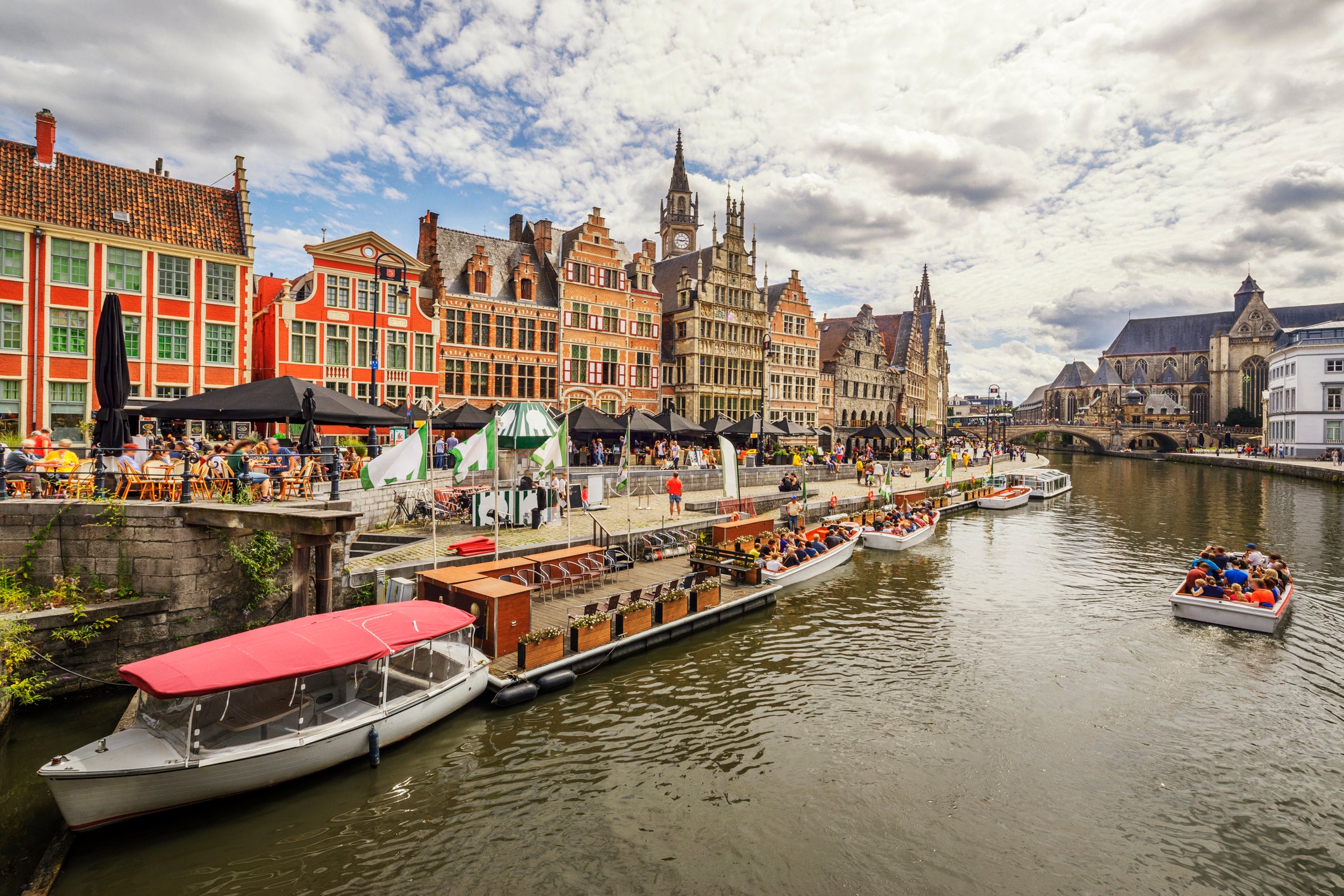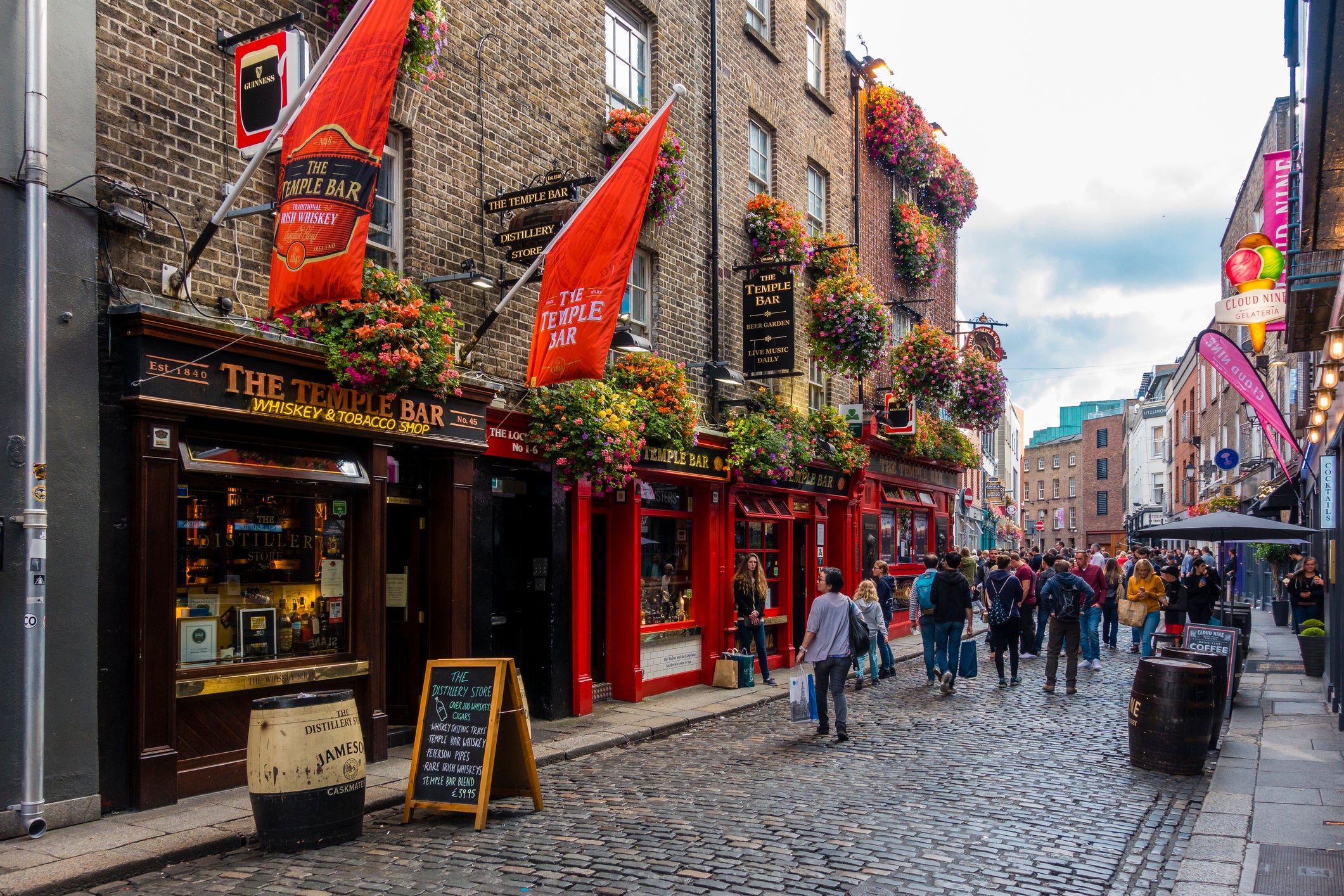‘Everything feels massively bleak’: The people leaving Britain for a new life
From Brexit to the cost of living crisis and frustration with politicians, Hannah Fearn hears the reasons why some have moved away from the UK – or are considering doing so


In July this year, Eleanor Shamber finally left the UK. She’d been considering the move for a while, but by the end of 2021 her family felt they’d reached a crucial tipping point.
“I remember the 1980s very vividly as a child and it seemed very much the same... Everything feels massively bleak,” she says.
At the start of the year Shamber, who previously taught university students, told her husband she couldn’t face the start of another September term in the UK and began scouring overseas job vacancies for something that might suit her. “Add in the cost of living increasing, and my work in higher education getting worse and worse – we were both working ridiculous hours with not very much return for family life.”
Shamber returned to her previous profession of communications and landed a role in Graz, in Austria, working for a research organisation.
The move has not been without challenges. Her youngest daughter is still settling into her new school and struggling to learn German quickly; both children and parents miss their friends and family back in the UK. But their quality of life, Shamber says, has transformed overnight.
Where before both parents had to work endless hours to make ends meet, now Shamber works while her husband is able to take the time to be a stay-at-home dad.
“Yes, we have slightly less financially – we’re still trying to get Austrian family allowance – but the difference is there’s only me working and I can support my family, so there’s always a parent around, and we don’t have ridiculous childcare costs anymore,” she says. “Now I walk to work. I work 15 minutes from my apartment, and I live in the middle of the city.”
When asked to characterise life in Austria she says: “Here everything works in a way that has been hacked away in the UK.”
It’s a description that recurs repeatedly speaking to people who have chosen to take the leap and leave Britain behind. There are a range of personal motivations, from the political (Brexit), to the personal (access to healthcare, or schooling), but they all coalesce around one point: the UK is becoming an uncomfortable place to live, with no sign that things will improve. For families in particular, life appears to be better elsewhere. The grass really is greener.
That was certainly the experience for charity worker Virginia Newton-Lewis, who moved to Sweden in 2019 when her employer offered her the chance to relocate. She described the decision to leave as a “tipping of the scales”.

“On the one hand, there was growing discontentment across many aspects of life. I was paying almost more than my mortgage for childcare and we couldn’t afford to move into London. We lived in Cirencester and because the [rail] season ticket was something ridiculous like £10,000 a year. I was doing lots of juggling to get tickets in advance,” she says. “And then there was Brexit: the growing realisation of what Brexit would mean. Putting all these factors together pushed us towards the opportunity.”
Newton-Lewis moved her family when they still had rights as EU citizens including the freedom of movement: “We feel like we got out on the last raft”. but that doesn’t mean the transition was easy. At first it was hard for her husband to find work as he was not a Swedish speaker. Then, just a few months after their arrival, Covid-19 hit and stalled their efforts to integrate into their new community.
Three years on, and with two young children aged six and four, they do not regret their decision to leave the UK behind. “It’s such a wonderful place to live with young kids. The quality of life for parents is fantastic. The infrastructure is good. We do pay more in tax, but I don’t begrudge a single penny because I feel we get so much more back.” Their verdict? They are probably financially in the same position as they were in the UK, but just much less stressed – which has its own value.
These families are not alone. A study by Total Jobs earlier this year found that 4.5 million job seekers said they wanted to leave the UK, and Google recently reported that UK searchers for “moving abroad” had hit a record high.

According to figures from the Office for National Statistics (ONS), the number of people emigrating out of the UK long-term in the year ending June 2022 was approximately 560,000. That included EU nationals pushed away by the hard Brexit deal, but also a growing number of British nationals. ONS statistics show that emigration peaked in 2005 when the economy was booming and global opportunities abounded, then dropped to a historic low during 2020 due to pandemic restrictions on movement, but is now climbing steeply again.
In 2013, a study of people leaving the UK, carried out by John Jerrim at University College London, cited work as their primary reason for leaving. The answers I have received now, point to problems with the wider political and economic climate rather than directly about employment opportunities. I asked Twitter users who had moved their lives overseas, or were now considering, doing so, to explain why. Here’s a snapshot of those responses.
“Left in July with a work opportunity to the Netherlands. Despite inflation being higher here and it being a pricey place to live, with its own issues (housing shortage), it feels like they have their heads screwed on for wider societal challenges (schools etc),” says one.
"I left for Covid and my experience is mostly London. What I noticed is a trend to depart from continental European values, adopting US standards. Main issues: the scale of (inefficient) privatisations, lack of public spaces, strong rising inequality, unaffordable living standards,” says another.
“The prospects of having a decent life in the long term had become abysmal. So I left, and am much happier for it. I got really tired of how poor the prospects for things to turn around were. There's no sense of seriousness in British politics – major political figures are like from a comedy show. The politics are dismal, infrastructure is poor, everything is inefficient…” says yet another.
A common thread linking these responses was the socio-economic position of respondents. The vast majority were professionals with the financial means to make such a significant change to their circumstances even in the middle of a cost of living crisis. Yet despite their relative financial privilege they were struggling – to afford suitable housing, to afford good quality childcare, to fund a comfortable life.

This points towards a building brain drain of professionals and skilled workers which could have long-term consequences for the UK.
Professor Michaela Benson, professor of public sociology at Lancaster University, has studied migration patterns of British citizens since the 1950s. She observes that emigration is not a new pattern for British people, and is in fact part of our heritage – think of the role that emigration played in propping up the British Empire – and so it’s not surprising that so many people are now reconsidering their futures. She explains: “Because of the nature of the British Empire and how labour was distributed around it, because of the military too, there are far more people who have direct experience of having lived somewhere else in the world or who have a direct family member and I think that’s quite unusual in the grand scheme of things.”
Over the last 70 years, Benson says, the level of outward migration from the UK has remained relatively stable. What’s changed now is that there is a higher rate of attrition in important skilled jobs such as healthcare, with doctors leaving the NHS due to feeling unable to make a comfortable life for themselves in the UK.
“The conditions we are in at the moment where we’re experiencing political and economic instability do make it easy for people who might have been on the fence to say, ‘what are we going to lose by leaving?’” she says. “That’s the story to take away from this: we do have to take those concerns seriously. We’re at a tipping point in terms of the political situation in this country and its consequences economically. I don’t think people leaving is the problem, but it tells what is. If as a doctor you can’t afford to live comfortably, what the hell is going on?”

Julian Humphrey, an A&E consultant who appeared on the first four series of Channel 5’s Casualty 24/7, is one of those who has left the NHS and the UK. He’s now an emergency doctor in a rural hospital in Western Australia. He now feels financially and socially better rewarded for his work, and is able to secure a higher salary on three days’ work than he did working full time inside the NHS. He also reports feeling challenged at work for the first time in years – something he considers a gift at 60, as he enters his final years in full-time employment.
“I was totally dedicated to the NHS,” he says. “I made a lot of great friends and colleagues, I had a great reputation and then essentially it came to thinking about what I was going to do when I came to 60. I didn’t really feel ready to retire.” The opportunity in Australia came up and he took it, intending for it to be a sabbatical – maybe a year, now that his children had left home and he had the freedom to try out something new. But when it came to considering a return to the UK and the NHS, the numbers didn’t stack up for him.
He describes integrating himself into the Australian healthcare system as a “massive culture shock”, but one which comes with its own rewards. “The resources are much better, you feel valued, the work-life balance is better, and there’s less stress at work. Patients are respectful because the training is really very good. It’s definitely more intensive. Your stature in the hospital in the department is a lot greater,” he says.
Humphrey now intends to spend the rest of his career in Australia, at least. He and his wife are considering relocating permanently, and one of their children is also considering joining them.
Naomi Smith, chief executive of the Best for Britain organisation, founded in the wake of the vote for the UK to leave the EU which now aims to “keep the UK working with the world”, says she has heard this story time and again.
“We had a skills crisis before this,” Smith explains. “The British skills crisis is long documented, and failed by successive governments and, frankly, business. Before any of this, before EU nationals were made to feel like pariahs, before those who hadn’t got their settled status left we had a shortage of occupations across multiple industries. You layer on top of that the mishandling of the pandemic, 2.3 million people with long Covid, and it’s a real problem. That spells big trouble for the future of UK Plc. If you are not going to let skilled immigrants into the country, and you’re also not tackling an ageing population issue, and you still make it incredibly difficult for people to take time out of work to have young children … well, it’s apocalyptic.”
This is my life that has been seriously affected. I’m £100,000 out of pocket due to lost business and additional expenses, plus all the stress of not knowing what was going to happen
Smith states that it’s important not to underplay the role that the decision to leave the EU has had in pushing many people towards the decision to leave – not just those from EU nationals who have lost their freedom to work and live in Britain. She says when the result was first declared, the 52/48 split indicated to most Remainers and internationalists that the Brexit deal that followed would have to be a soft one to reflect the balance of attitudes among the electorate. “But of course we didn’t get that,” she says. “We ended up in a situation where we don’t get invited to the top table anymore. When we did host Cop26 in Glasgow, Johnson had to face the cameras and deny, when asked, that Britain is a corrupt country. How far we’ve fallen.”
This loss of British prestige and influence post-Brexit is among the reasons that Becky Slack, founder and managing director of Slack Communications, a marketing and communications firm, has decided against returning to the UK even though that’s where her business is registered. After a stint in France and later in Brussels, she now lives and works in Ghent.
“I feel like I’ve had a load of my rights taken away from me and that has made me feel really cross. I still feel really angry about it," she says.
“This is my life that has been seriously affected. I’m £100,000 out of pocket due to lost business and additional expenses, plus all the stress of not knowing what was going to happen. I just hate the way the British political system is operated at the moment. It feels divisive and polarised. It all started with Brexit and, having lived in two European systems where it doesn’t feel quite so nasty, I don’t want to move back to a country that’s so divided,” she adds.
“In France and Belgium taxes are higher and you have to make a contribution towards healthcare but, as a consequence, the services are really good. The other week my boyfriend had an allergic reaction, and we went to A&E on a Friday night. We were seen immediately, no wait, no hanging around in corridors.”

The distraction of Brexit, the way it has dominated political debate and process for almost a decade now, has prevented progress being made on other social issues that dog the UK, including healthcare and social care.
Civil servant Claire has a four-year-old child who is non-verbal and has severe special educational needs but who, due to the pandemic, has only seen a paediatrician once and has no special school place secured for him yet. The family paid £5,000 for genetic testing to get a diagnosis of his condition privately – a condition she could pass to any future children. She has applied for a statement of his needs and a place at a suitable school near her home but feels forced to leave the UK if that doesn’t come through.
“I’d be very surprised if we don’t get told that he should go to a special school, but I’ve been talking and lots of them already don’t have any places for September 2023. One said they don’t have any spaces until 2025. If we didn’t get a place, he would get a mainstream school place with a one-to-one support. But they don’t all come from a teaching background, the reality is you don’t need any qualifications to be a one-to-one. That’s their entire education when they’re a child who actually needs a high level of specialist support.”
Claire fears that in mainstream schools in the UK, her son would be forced out early most days due to being disruptive. “My son is four but he’s cognitively 10 months old. If he was expected to go to mainstream school I would get that call every day because he would get really upset in that kind of classroom environment.
“We’ve had to pay for all the support we’ve had. Because my husband works for an American company, there’s a possibility that we would be able to get a transfer to the US office. We would then be able to send our son to a private school for children with special needs which isn’t an option in the UK. That’s something we’ve been considering – and if it came to it, it’s something we’d be prepared to do.”

However, some who have already taken the leap, or who have moved to the UK for a better life themselves, sound a note of caution.
Irish journalist Jennifer McShane moved to London from Dublin in part because of the cost of living in Ireland with a disability. She warns potential emigres to think very carefully.
“The UK has its problems, and many of them,” she says, “but in Dublin, the rental crisis means there’s almost nothing to rent and anything that is available is around €2,500 to €3,000 [£2,180 to £2,600] per month minimum. It’s more expensive to rent in Dublin than London. We also have a woeful public transport system so I relied on taxis to get around, by and large, due to a disability. We have no NHS so everything costs, GP, prescriptions, dentists.
“I moved [to London] for more jobs and ease of getting around; the buses are incredible here. And I could afford to rent on my own here, only a dream at home. The NHS have been amazing too and I can live fully independently here in a way that’s manageable, even though it’s costly.”
That won’t be enough to convince those who are converts to the overseas way of life. Academic Dr Lisa Schipper left the UK for Austria in 2021. She had a job at the University of Oxford, but was uncomfortable about the prospects for her family in the UK. “The future felt very bleak for research funding, for the quality of my child’s education, and healthcare, and even because I was so tired of cycling on such bumpy roads," she says.
As a European, with a child who holds both a Swedish and German passport, she feared that the school curriculum would become more inward looking as a result of Brexit and lack the global and European focus she felt her child deserved. The state of the NHS was a factor too, as she requires regular appointments.
Like others, the adjustment hasn’t been seamless. Schipper reports missing the UK, particularly food and the range of vegetarian options, but feels that life as a citizen of Europe offers her and her family much more stability.
“I would say in terms of prospects for the future, it feels much more comfortable here,” she says. “It’s comfortable for those of us who have the privilege of moving, of course. This is an option that’s only available to a very few.”
Join our commenting forum
Join thought-provoking conversations, follow other Independent readers and see their replies
Comments



Bookmark popover
Removed from bookmarks